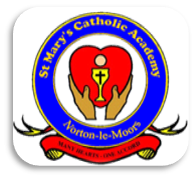The foundation Stage
Here at St Mary’s, we consider the Foundation Stage to be an essential building block in your child’s education. We value the relationship between staff and parents at school as we together strive to offer a first-rate start to your child’s education.
In the Foundation Stage we aim to:
- Support the transition from pre-school to the Foundation Stage, making progression a fun and exciting experience
- Provide a caring environment in which each child may feel safe, happy and secure
- Encourage a commitment to the Catholic faith. We are a Catholic school and our Catholic ethos underpins all the teaching and learning at St. Marys
- Provide a range of first-hand experiences which promote active learning
- Promote high self-esteem and confidence in children through the encouragement of independent learning
- Practice and refine social skills, including an awareness and understanding of others
- Build on children’s experiences in order to stimulate and challenge their own thinking
- Provide a broad and balanced curriculum which enables each child to reach their full potential
- To develop children’s attention and persistence, to concentrate on their own play or group tasks
- Encourage children to be responsible for their own learning and become reflective thinkers
- Develop skills in relation to the six areas of learning within the Early Years Foundation Stage Curriculum
Learning within the Foundation Stage
Our early year's curriculum is a carefully planned learning experience. We offer a topic-based curriculum, alongside the planning and implementation of children’s interests, and provide a flexible, play-based approach to learning, providing additional challenges and creating relevant teaching opportunities that deepens learning and understanding.
Our daily routines support children to settle in quickly and helps to develop both confidence and independence. The learning environment is set up to develop appropriate skills where resources are considered carefully and are used to provide challenge, curiosity and to match the children’s interests. Ongoing assessment allows us to respond quickly to the children’s learning by enhancing ideas and modelling vocabulary that is relevant to the children.
Staff observe, listen to and work with children to facilitate learning. Positive relationships and good communication play a vital part when planning for individual needs. Every child has the support they need to flourish.
All children access a broad, balanced, well-resourced curriculum, which offers opportunities for enjoyment and success through active learning. Planned activities aim to foster good social relationships, promote equal opportunities and support special educational needs. Children learn to co-operate and listen to others. We use short teacher inputs and access to a cross curricular indoor/outdoor provision. Staff plan for and ensure that both the inside and outside spaces are fun, safe, engaging and offer challenges.
At St Mary’s we encourage children to develop their language, imaginations, to get actively involved in learning and to make decisions. Through their play, our children will:
- Explore, develop and represent learning experiences that help them to make sense of the world
- Practise and build up ideas, concepts and skills
- Learn how to understand the need for rules
- Take risks and make mistakes
- Think creatively and imaginatively
- Communicate with others as they investigate and solve problems
Parent Partnership within the Foundation Stage
Our Partnership with parents means:
- We operate an ‘open door’ policy
- Regular opportunities to come in to school to engage in your child’s learning
- You are your child’s first educators
- You are essential to their success
- Daily attendance is expected (unless your child is too unwell for school)
- Support for school ethos, masses and liturgies
- Home-School Agreement is honoured
- Regular communication is promised via ‘Evidence Me’
- Weekly celebration assemblies
